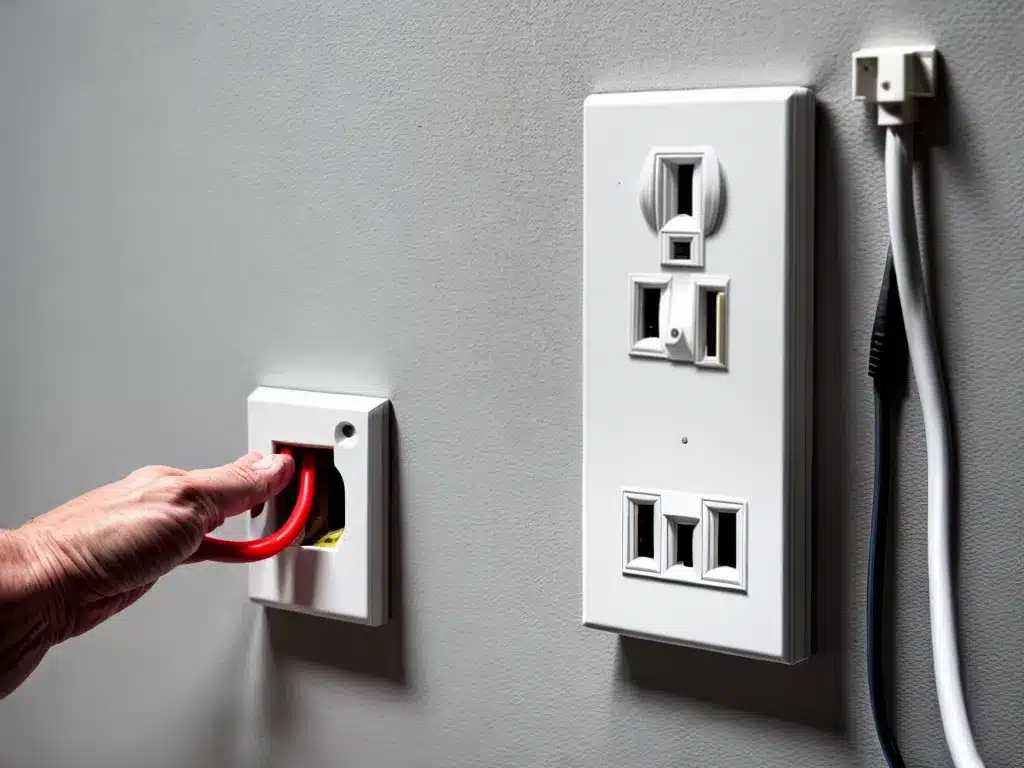
Electrical Outlet Misuse: A Hidden Danger in Plain Sight
Outdated wiring and improper use of electrical outlets in homes can lead to dangerous situations that many homeowners are unaware of. As a homeowner, I want to bring awareness to these hidden dangers that exist in plain sight in many homes across the country.
Common Ways Electrical Outlets Are Misused
Using electrical outlets incorrectly or beyond their intended purpose is surprisingly common. Here are some of the most common ways I see electrical outlets being misused in homes:
-
Overloading outlets – Plugging in too many appliances into one outlet can lead to overheating of the wires behind the wall. This can start electrical fires.
-
Using extension cords as permanent solutions – Extension cords are meant for temporary use but many homeowners use them as permanent wiring. Fraying and deteriorating extension cords are a fire hazard.
-
Outdated wiring – Homes more than 40-50 years old likely have outdated 60 amp electrical systems. Connecting modern high-power appliances to these outlets pushes them beyond capacity.
-
Plugging high-draw appliances into lightweight extension cords or power strips – Devices like space heaters, window AC units, and refrigerators require heavy-duty extension cords and outlets due to their high energy draw.
-
Damaged outlets or cords – Outlets that are cracked, corroded, or have loose connections can spark fires or shock people. Fraying cords also pose serious risks.
Dangers from Electrical Outlet Misuse
Misusing electrical outlets may seem harmless on the surface, but it can lead to very real dangers like fires, shocks, electrocution, and equipment damage.
-
Electrical fires – Overloaded, damaged, or outdated wiring and outlets can overheat and ignite fires inside walls that spread rapidly. Electrical fires account for over 50,000 house fires per year.
-
Shocks and electrocution – Exposed wiring from damaged cords or outlets can electrocute someone if they touch it. Children are particularly prone to poking things into outlets.
-
Equipment damage – Voltage spikes from overburdened circuits can damage or destroy televisions, appliances, and other electronics plugged into outlets.
-
Power failures – Drawing too much power through outlets connected to outdated circuit breakers can trip the breakers or blow fuses, knocking out power to parts of the home.
Signs of Electrical Outlet Dangers
Many warning signs indicate an electrical outlet may be misused or in need of replacement. Being aware of these signs helps homeowners identify potential dangers:
-
Flickering lights – This usually indicates an overloaded circuit that could be at risk of failure.
-
Discolored or warm outlet covers – A sign of overheating that signifies outdated wiring.
-
Buzzing or crackling from outlets – Electrical arcing noise points to a loose connection in need of repair.
-
Frequent circuit breaker trips – Suggests excessive current draw exceeding the outlet’s capacity.
-
Melting odor – Never ignore burning smells from outlets which likely indicate overheated wiring.
-
Loose outlet covers – Allows exposed dangerous wiring if an object is inserted.
-
Cracked or damaged outlets – Severely hazardous due to exposed live wires and insulation.
Preventing Dangers Through Proper Electrical Practices
The good news is electrical fires, shocks, and electrocution from outlet misuse are largely preventable by following good electrical safety practices:
-
Never overload outlets – Be mindful of outlet capacity and avoid plugging in too many appliances.
-
Use heavy-duty extension cords – Lightweight cords are for temporary low-power uses only.
-
Update outdated wiring – Hire a licensed electrician to inspect home wiring every 10 years and make necessary upgrades.
-
Install AFCI outlets – Arc-fault circuit interrupter outlets detect dangerous electrical arcing and shut off power.
-
Use outlet covers – Cover unused outlets to protect from shocks and electrocution.
-
Label circuit breakers – To easily shut off power in an emergency for safety.
-
Consider GFCI outlets – Ground-fault circuit interrupter outlets prevent shocks in wet areas like kitchens and bathrooms.
Conclusion
Electrical outlets are capable of powering our modern lives, but they also pose dangers when misused or outdated. Homeowners must be vigilant against overloading outlets, using extension cords improperly, ignoring warning signs, and neglecting to update old wiring. Following basic safety practices goes a long way in preventing fires, shocks, and electrocution from hidden electrical hazards. A small investment in safety and awareness helps ensure electricity continues powering our lives safely and reliably.
